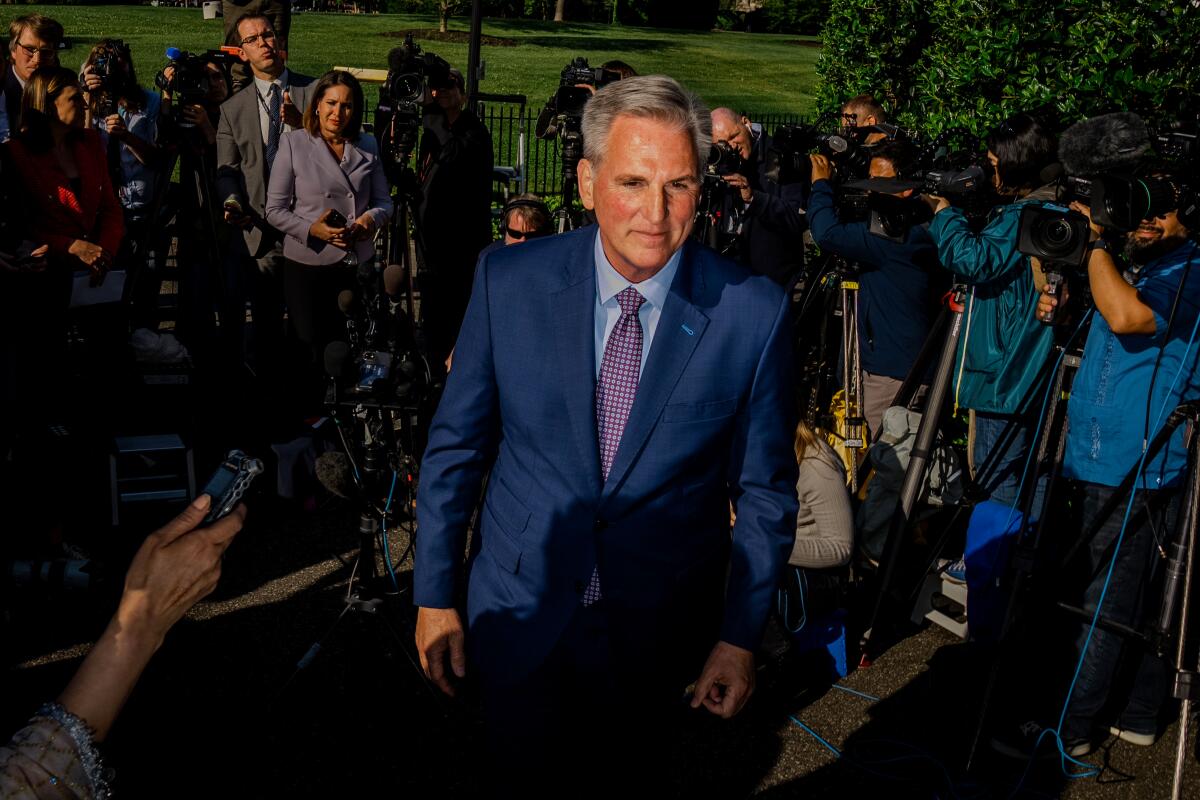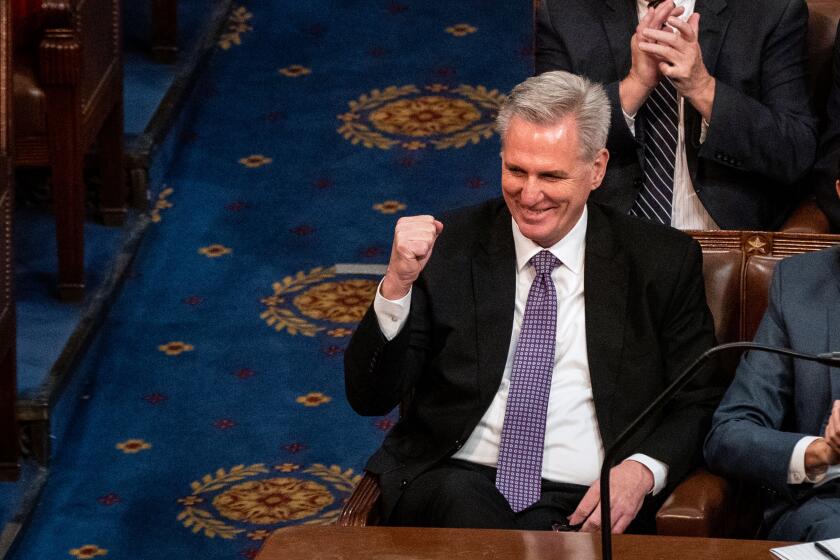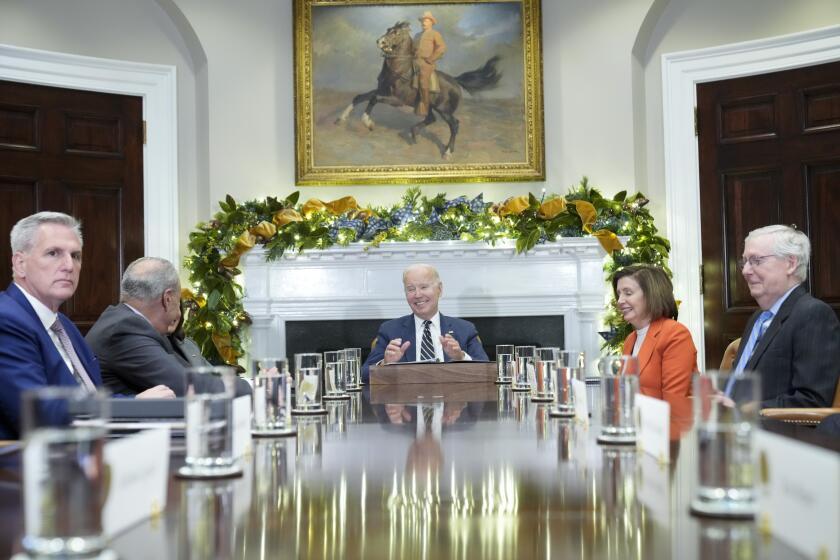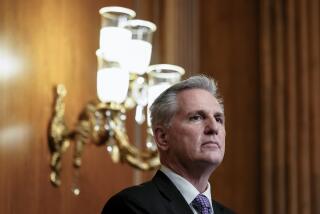Kevin McCarthy, facing his biggest test yet, reports no movement on debt limit deal

- Share via
WASHINGTON — The last time House Speaker Kevin McCarthy sat down with President Biden in the Oval Office, he struck a firm but hopeful tone, telling reporters that the pair could “find common ground” to avert a calamitous default on U.S. debt.
Ninety-seven days later, as McCarthy met with the president Tuesday for only the second time since becoming speaker, the two sides were no closer to a compromise — paving a perilous path toward a historic default that could crash the stock market, lead to millions of job losses and send the country into a deep recession.
“Everybody in this meeting reiterated the positions they were at,” McCarthy (R-Bakersfield) said after meeting with Biden and House Democratic leader Hakeem Jeffries, Senate Majority Leader Charles E. Schumer and Minority Leader Mitch McConnell. “I didn’t see any new movement.”
House Republicans have threatened to allow the U.S. to default on its debts unless raising the spending cap is paired with discretionary spending cuts. Biden and Democrats say they won’t negotiate on budget cuts unless Congress agrees to increase the legal borrowing limit without conditions — a once routine practice that has become more acrimonious amid a growing partisan divide in Congress.
Biden delivered remarks and took questions from a small group of reporters following the meeting, saying he was “absolutely certain” the U.S. would not default on its debt obligations.
“I made clear during our meeting that default is not an option,” he said.
The president said he and congressional leaders would reconvene on Friday. White House and congressional aides will continue to meet throughout the week, he added.
Biden described the tenor of the talks as “very measured and low-key,” adding that “occasionally there would be a little bit of an assertion that maybe was a little over the top from the speaker.”
The meeting marked perhaps the biggest test yet for McCarthy, who needs to balance the urgency of raising the debt limit with satisfying far-right conservatives who could end his speakership.
The Bakersfield Republican clinched the gavel in January by caving to the hard-line faction of his party, striking a bargain that allows a single member to force a vote to oust him as speaker. Any deal he negotiates with the White House or the Senate would require convincing that same group of far-right House members.
Kevin McCarthy’s decades-long dream of becoming speaker of the House was nearly brought down by a band of Republican radicals.
McCarthy’s critics say that his deal with the far right wing of his party weakened his position. But the speaker has defied those expectations in recent weeks, unifying Republicans to pass a bill to raise the debt ceiling by $1.5 trillion or for just one year — whichever comes first — while also capping future spending growth at 1% a year over the next decade. Such a bill would set up yet another fiscal showdown months before the 2024 presidential election.
The legislation, which would cut future deficits by $4.5 trillion, also takes aim at Democratic priorities.
The bill would add new work requirements for Medicaid recipients and others who receive federal assistance, end Biden’s student loan debt forgiveness program, claw back unspent COVID-19 funds and repeal parts of the White House climate agenda. Though the bill has no chance of passing a Democratic-controlled Senate or securing Biden’s signature, it strengthens McCarthy’s hand as he looks to hash out a deal with a so-far uncompromising administration.
McCarthy told reporters that he asked Biden about potential spending cuts and that the president didn’t give him any. Biden later said that he told congressional leaders he was “prepared to begin a separate discussion about his budget, spending priorities — but not under the threat of default.”
Fabian Núñez, a Democrat and former speaker of the California Assembly who has negotiated budgets with McCarthy, describes the Republican’s tactics as “three-dimensional,” saying the speaker is staking out a position that considers the entire GOP conference instead of just his right flank.
“Kevin has never been do-or-die in the way he approaches negotiations,” Núñez said. “He’s usually at his best when he’s under the gun.”
But so far McCarthy’s methods have failed to move Biden, whose own budget proposes reducing the deficit by $3 trillion over the next decade by increasing taxes on the wealthy and corporations and allowing the government to negotiate drug prices in order to reduce healthcare spending.
Biden suggested that McCarthy was beholden to an “extreme” faction of his party, but added, “I trust Kevin will try to do what he says.”
Biden and McCarthy will have to find compromise come January, when the GOP takes control of the House of Representatives and the Bakersfield Republican is expected to secure the Speaker’s gavel.
The president, who announced his reelection bid in April, has used the fight over the debit limit to sharpen his campaign rhetoric, painting Republicans’ proposed cuts as damaging to the American middle class. The White House has circulated several memos arguing that the GOP bill would even slash stated Republican priorities including policing, anti-drug-trafficking efforts and services for veterans
Before Biden sat down with congressional leaders, the White House had already announced that he would travel to a Hudson River Valley congressional district on Wednesday to give a speech on how the GOP bill would include cuts to veterans’ healthcare visits, school staffing and a food program for homebound seniors. The district, which Biden won in 2020, is home to Rep. Mike Lawler, a vulnerable Republican who will likely have to win reelection if the GOP is to have any hope of expanding its five-seat majority in the House next year.
Instead of focusing his attention on McCarthy, Biden has leaned on McConnell, with whom he cut deals for the Obama administration during the 2013 fiscal cliff crisis, the debt-ceiling standoff in 2011 and the 2010 fight over extending Bush-era tax cuts. But McConnell insists he’s sitting this one out.
Rohit Kumar, McConnell’s chief negotiator during the 2011 talks, said the minority leader has made the calculus that intervening would not yield the same response in the House as a Biden-McCarthy deal.
“If he thought that a deal that he would strike with President Biden would have a reasonable chance of becoming law, then he might be more willing to step into that role,” said Kumar, who is now co-leader for national tax services for the accounting firm PwC.
Much of Biden’s thinking is shaped by the 2011 debt crisis, when he served as President Obama’s vice president and the administration agreed to deep cuts that avoided a default but ultimately led to a downgrade of the nation’s credit rating for the first time.
Biden said he wouldn’t rule out a short-term extension of the debt limit, which would punt the deadline to raise the borrowing cap to align with annual talks over government funding — which will run out on Sept. 30. But McCarthy dismissed the idea earlier on Tuesday.
The president also said he had investigated invoking the 14th Amendment, which states that the validity of the public debt shall not be questioned, as a means of unilaterally working around the disagreement. But the problem, he added, is that the government would have to defend that claim in court, and he didn’t see litigation as a viable solution.
But time is short. Treasury Secretary Janet L. Yellen has warned that the U.S. could be unable to pay its bills for the first time ever as soon as June 1. An analysis released Tuesday by the Washington-based Bipartisan Policy Center projects that between early June and early August, the U.S. will not be able to meet its obligations as a borrower, supporting Yellen’s forecast.
The bond market has already reacted to fears that the U.S. may default. Short-term bond prices have steadily declined since late April.
After Biden and McCarthy met on Tuesday, Mark Zandi, chief economist at Moody’s Analytics, assigned a 10% probability that the U.S. will breach the debt ceiling.
“Even a lengthy standoff no longer has a zero probability,” he said. “What once seemed unimaginable now seems a real threat.”
The two sides still have ample time to negotiate, even as Biden is set to travel abroad for a weeklong trip to Japan, Papua New Guinea and Australia next week, Kumar said. He recalled his own experience in 2011, when “there wasn’t even a prospect of an agreement” just 72 hours before the deadline.
“Unfortunately, because of the history of this issue, you can’t sort of know with confidence that no deal is going to be struck and no breakthrough is going to be reached in like the last couple of days,” he said.
Biden said “it’s possible” that he’ll skip the foreign trip, but not likely.
“If somehow we get down to the wire and we still hadn’t resolved this and the due date was ... when I was supposed to be away, I would not go,” he said.
Phil Schiliro, a former director of legislative affairs in the Obama White House, said he could see the parallels to 2011 in that the problem lies within the House Republican caucus.
“It wasn’t that President Obama could reach an agreement. It was whether or not the House Republican caucus would support an agreement its leadership reached,” he said.
The difference this time compared with previous fights, Schiliro said, is that in the past, few thought breaching the debt ceiling was a serious possibility — a catastrophic outcome that could tip the country into a recession.
“American families end up being the hostages … that’s why default can’t be an option,” he said.
More to Read
Get the L.A. Times Politics newsletter
Deeply reported insights into legislation, politics and policy from Sacramento, Washington and beyond. In your inbox three times per week.
You may occasionally receive promotional content from the Los Angeles Times.













